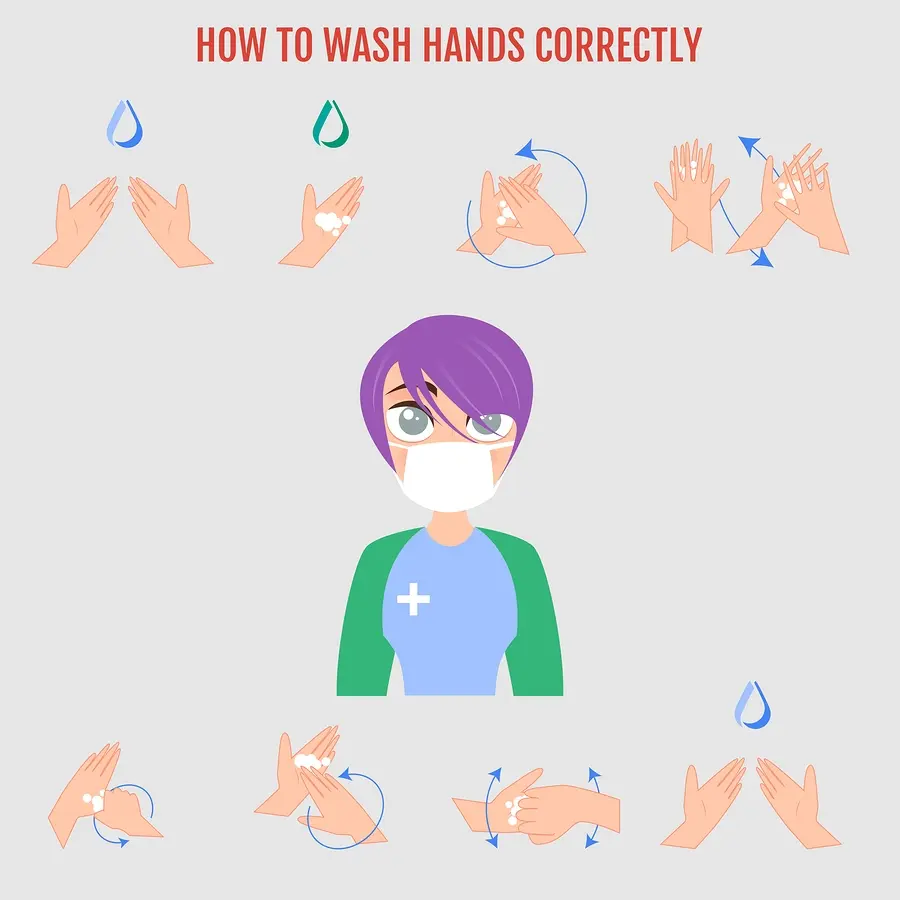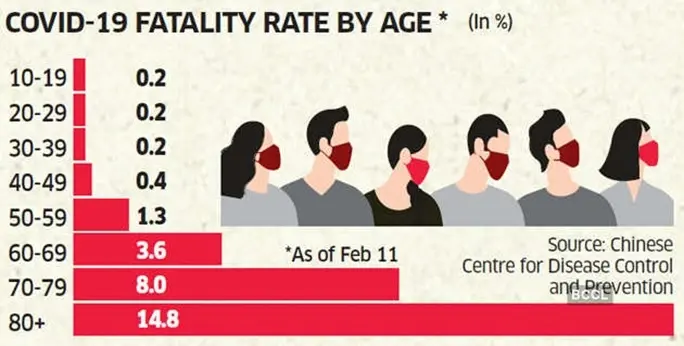by Dan Sullivan
COVID-19 is the name given to the Corona Virus Disease. This disease is spread by a deadly virus which is known as the Coronavirus.
Contents
Just like any other virus, Coronavirus is a microscopic parasite that is considerably smaller than bacteria. The World Health Organization (WHO) has named the virus as SARS-CoV-2 which is responsible for the current pandemic. SARS-CoV-2 is abbreviated as Severe Acute Respiratory Syndrome Coronavirus (type) 2. Before this official name was introduced, it was referred to as "2019 Novel Coronavirus."
In December 2019, the outbreak was acknowledged in Wuhan, China. Soon after the identification, on the 30th of January, the World Health Organization declared COVID-19 as a public health emergency on an international level. Soon after the declaration, on the 11th of March, COVID-19 was identified as a pandemic. Since that time, the world is under the situation of a pandemic.
This graph shows the distribution of confirmed cases of COVID-19 all over the world by the 26th of March, '20. Here for latest COVID-19 Statistic

Let's learn more about COVID-19 in detail!
In the times of a pandemic like COVID-19, it is very important to learn about the symptoms of this disease.
Contents
The symptoms include:
Regardless of the external weather conditions, the body temperature of a normal person remains between 36°-37° centigrade. This happens due to the process of homeostasis that keeps the internal environment of our body balanced. However, when the body temperature of a person exceeds the average range, it becomes a medical sign; fever.
Usually, coughing is a response by which our bodies react to dust particles or smoke that enter in our airways. Normal coughs aren't dangerous or a medical sign. However, if a person is experiencing dry cough; the cough in which thick mucus "phlegm" isn't produced, it can be a medical emergency.
Dyspnea is commonly known as shortness of breath. A person suffering from dyspnea is supposed to feel tightening in the chest, the need of air, struggle in breathing, and suffocation under normal circumstances such as resting, walking, talking, and etc.
Fatigue is a wide medical condition that includes dizziness, sore muscles, headache, weakness, and etc.
Rhinorrhea is commonly known as a runny nose. A person having rhinorrhea experiences thick mucus or clear liquid running from the nose. It can be one of the COVID-19 symptoms.
If you are experiencing the symptoms of COVID-19 that we have mentioned above, consult with a health expert, as soon as possible.
Watch this video to know what happens if someone catches COVID-19:
Since it is a contagious disease, it can spread from person to person through tiny droplets from mouth or nose that result from coughing, sneezing, and exhaling. When a healthy person is 1-meter or less distance away from an infected person, if the infected person sneezes or coughs, the healthy person is most likely to get exposed to the COVID-19.
Otherwise, the disease is spread when a healthy person touches the contaminated objects and then touches their face including the mouth, nasal entrance or eyes with the same hands.
According to the World Health Organization, in most of the cases, this disease is spread through respiratory droplets, not air.
It is very important to take safety precautions so that you are not at a high risk of being exposed to this deadly virus. To make it easy for you to remember these safety measurements, we have created a list of ways to protect yourself from the spread of COVID-19.
Here you go:
Clean your hands on a daily basis. To do so, use an alcohol-based hand washing liquid. Wash your hands in a proper way by following the essential steps;

Social Distancing
Keep at least 1-meter distance from another person. This is because you might be unaware of whether the person standing next to you has COVID-19 or not. Thus, you need to make sure that you don't inhale the respiratory droplets of another person when they sneeze or cough. Avoid attending social gatherings. Stay home, stay safe.
Try to avoid touching your face. This is because you may have touched a contaminated object before. If you'll touch your face with the same hands that carry germs, the germs might enter your body through your mouth, nasal cavity, and eyes.
Strengthen your immune system by eating right, sleeping well, and etc.
Clean the surface and any objects in your house that you think might have been touched by someone; the doorknobs, tables, etc.
To watch the video by WHO about preventing the spread of COVID-19, click on the link below:
According to the studies, people with a weakened immune system are more likely to develop a severe illness caused by COVID-19. If we classify them, the categories will be:
This graph shows the fatality rate due to COVID-19 by age:

No! Just don't! There is a lack of awareness in people when it comes to medicine. People often take antibiotics to treat a viral disease, little do they know that it is not going to treat them right! You should always remember that antibiotics only treat bacterial diseases ; diseases caused by bacteria. Since COVID-19 is a viral disease ; caused by a virus, an antibiotic cannot treat it! It is of no use when it comes to treating viral diseases.
Unfortunately, not yet! Any vaccine takes around 8 -12 months before being eligible to be used on patients. Although many scientists, researchers, technologists, and other health care professionals are trying to form a vaccine for COVID-19 without any delay, they haven't been prospered any yet.
Keeping in mind that disposable masks can only be used once, use them wisely. Wearing a mask can become helpful when you are infected by the virus, or when you are taking care of an infected person. Otherwise, you are wasting a mask by wearing it without need. WHO acknowledges the shortage of masks all over the world, and that's why it suggests you don't misuse and waste a mask that can be used by a deserving person and save a life.
When the disease becomes severe in a patient, they are moved to isolation wards without wasting any time. The purpose behind moving them to isolation wards is to keep them away from healthy people that may catch the disease from them. Not just that, but the isolation wards are equipped with the latest medical equipment that is needed to treat the patients.
Not just the patients, but during this difficult time, we suggest everyone goes into self-isolation. Go into quarantine for a while. Maintain social distancing. It is not just beneficial for them, but you too.
Not really. A lot of myths are becoming popular with time about this disease. One of these myths is that the weather effects on COVID-19. Many people believe that extreme weather conditions such as summers will kill the virus. Let's make it clear to you! The equilibrium of your internal body conditions is maintained by the process of homeostasis. The average temperature of a healthy person's body is 36°-37° centigrade. Regardless of the external conditions, the body temperature remains constant. It means that the virus will still be able to affect a person in the same way as it'd do in any other weather condition.
Viruses are dead outside a human body. They only get active; start reproducing, when they are in the hostage's body. This is because a virus needs an environment to survive in. This environment is provided to it in the human body. A virus can't replicate itself outside of a living body. It will only come into action when introduced to the internal affairs of our bodies.
Well, you must be well-aware of the current situation of the world. This disease has become a pandemic, causing a sense of threat and afraid of people all over the world. Most of the regions are facing a situation of complete lockdown so that the respective government prospers to maintain the law and order situation in the region. People whose lives depend upon daily wedges, they are facing a hard time at surviving this pandemic since they might not die of COVID-19, but hunger.
The most impact has been shown in the education system all over the world. In an educational institute, there are a lot of students, barely maintaining any social distance; hence, it was decided to shut down all the educational institutes until the situation gets better. This has affected the lives of students all over the world.
To watch the live update of COVID-19, click on the link below:
In this guide, we tried to answer all the frequently asked questions related to COVID-19. Our purpose is to spread awareness to people and help them in understanding the situation better.
If you found this guide informative, don't forget to share this information with your friends and family.
Stay home, stay safe!

About Dan Sullivan
Dan Sullivan is a renowned professor and esteemed education writer with a passion for inspiring students and transforming the field of education. With a diverse background in academia and practical teaching experience, he has become a leading figure in educational research and pedagogy.
 |
 |
 |
 |
Check These Out
Let's get FREE Gifts together. There're other Freebies here
AdBlock now to see them all. Click a button below to refresh
 |
 |
 |
 |